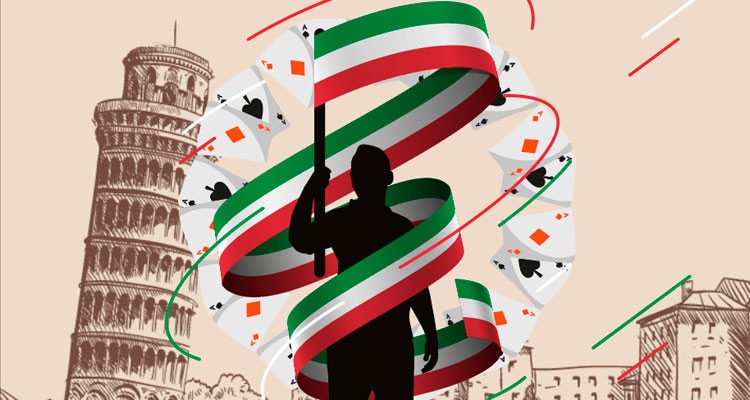Italy is a European country with rich gambling history. The word “casino” itself originated in this country. The modern Italian market is one of the biggest in the EU and has great development potential. In 2020, Italians wagered €88.38 billion, generating €12.96 billion in gross gaming revenue (GGR).
The Coronavirus outbreak and closure of all gambling venues in 2020, however, led to a huge decline in GGR. Strict gambling laws and high taxes also constrain market growth.
Read this Login Casino article to learn about the peculiarities of the Italian gambling system, local regulations and taxes, and preferences of players in Italy.
The history of gambling in Italy
Gambling in Italy has a long and rich history. First games of chance date back to the Empire of Rome. At the time, the game Ludus Duodecim Scriptorun, the early version of backgammon, was a common pastime activity among the legionaries. The Roman soldiers also carried this game over to other European states.
Italy is the home to various games of chance. In the fifteenth century, the game of baccarat was invented there. Modern bingo resembles the Italian game Lo Giuoco del Lotto D’Italia, which was widely played in the country in the 1530s.
The first Italian gambling establishment – Ridotto – opened its doors in Venice in 1638. The government allowed the launch to control the casino sector. The entrance to the gambling house was free of charge but only the richest citizens could play there as stakes were extremely high. Visitors could take parts in games of Biribi (version of the lottery) and Baretta, both of which had extremely high house edge.
In the 1930s, Mussolini’s government legalized games of chance. However, the first gambling law – Decree №496 – was adopted only in 1948.
Since 2006, the Decree of the Agenzia Delle Dogane e Dei Monopoli allows private companies to offer sports wagering services online and offline. Online casino games in Italy became a legal activity only in 2011 with an amendment to the Decree.
Structure of gambling in Italy
The gambling sector of Italy can be divided into online and offline niches.
| Land-based gambling | Online gambling |
| casinos;casino table games;slot automats and slot halls;pool betting;bingo;lottery games. | sports and horse race wagering;pool wagering;digital and live betting (plus, fantasy sports);remote casinos (slots, roulette, and table games)poker and card games;skill games (tournaments and non-banked poker);bingo;betting exchange;remote lottery. |
Despite the popularity of casino games, there currently are only five brick-and-mortar casino venues in Italy:
- Casino di Campione d’Italia;
- Casino di Sanremo;
- Casino di Venezia (Summer Casino);
- Casino di Venezia (Winter Casino);
- Casino de la Vallee.
At the same time, Italy has hundreds of gaming halls with over 397k slot machines. There are also around 250 bingo halls and 30 poker clubs.
Online gambling in Italy is extremely popular with over 200 websites operating in the markets. The vast majority of them are online casinos and sportsbooks.
Read more: Top Trending Lottery Websites
Gambling laws and regulations in Italy
Gambling laws in Italy set a clear difference between games of chance and games of skill. As for games of chance, the Italian government allows the following activities:
- casinos (land-based and remote);
- sports betting (terrestrial and online);
- horse race wagering (online and land-based);
- virtual and fantasy sports betting;
- online wagering exchanges;
- gaming halls;
- bingo halls and online bingo;
- lottery (online and offline).
Additionally, gambling is considered illegal when it’s performed in a public place, private club, or a place open to the public.
As Italy is a part of the European Union (EU), all EU gambling directives apply there. Besides, current Italy’s online gambling laws are compliant with the EU regulations.
Amministrazione Autonoma dei Monopoli di Stato (AAMS), or Autonomous Administration of the State Monopolies, is the main gambling regulator in Italy. The Administration issues licenses supervise and regulate all gambling activities in the country.
Like in many EU counties, the legal gambling age in Italy is 18.
How to get a gambling license in Italy?
AAMS grants licenses for the following gambling activities:
- skill games;
- tournament/solitaire poker;
- cash games of poker;
- casino;
- fixed-odds and totalizator sports, horse race, and other types of betting;
- horse pools;
- bingo.
If any casino or online betting website operates in Italy without a permit, it will get blocked by Internet service providers.
AAMS sets multiple requirements for the private companies that want to obtain Italy’s gambling license:
- In the past two years, have a turnover of at least €1.5 million;
- Have official residence and tech support in one of the EU states;
- Have a website registered on an .it domain/subdomain;
- Present identification documents of founders, shareholders, and key employees of the company;
- Have an active account in an Italian bank;
- Present proof of financial stability;
- Submit proof of gambling software quality;
- The website and games description must be available in the Italian language;
- Send a detailed business plan in Italian.
The ops also have to pay a €350k fee (+20% VAT, annually). The operators are granted a license after a three-month approval period. According to Italian law, AAMS can issue up to 120 gambling permits.
Tax system
Italy has one of the highest tax rates on gambling activities, even by European standards. And in the past few years, the government of Italy has increased the gambling taxes twice – in 2019 and 2021. The current gambling levy depends on the form of gambling activity:
- sportsbooks– 18% of GGR;
- virtual and daily fantasy sports wagering – 22% of GGR;
- digital sportsbooks – 22% of GGR;
- brick-and-mortar casinos – 0.5% of turnover;
- remote casinos (3% on poker tournament buy-in sold) – 25% of GGR;
- gambling automats – 18.85% of GGR;
- video lottery automats – 6.75% of GGR;
- bingo – 11% of GGR;
- online bingo – 25% of GGR;
- horse race betting – 43% of GGR;
- online horse race wagering – 45% of GGR.
Apart from that, the Italian authorities have recently introduced an additional 0.5% turnover tax for sportsbooks. The government claims that it is a temporary measure, adopted to revive the economy after the pandemic crisis. In addition, all businesses in Italy have to pay a corporate levy of 27.5%.
Players don’t pay any taxes if they play at licensed gambling venues. However, if a gambler goes to an illegal online casino in Italy, they have to pay income tax on all obtained prizes.
Gambling regions in Italy
The terrestrial casinos can be found in four Italian cities:
- Sanremo;
- Saint-Vincent in the Aosta Valley region;
- Venice;
- Campione d’Italia.
According to the data from Statista, in 2020, the most profitable gambling regions were Lombardy, Campania, and Lazio.
Although Italy has uniform gambling laws, there are several autonomous regions with unique gambling landscapes.
Campione D’Italia
Located in the Como province of Italy and near the Swiss border, Campione D’Italia is a municipality with a unique legal status. As of January 2020, it is a part of the European Union, where Swiss tax rates apply. Before that, the region de facto belonged to Switzerland.
For over a hundred years, the region was home to the largest casino in Europe – Casino di Campione. Founded in 1917, the gambling establishment was the biggest employer of the municipality. The gambling venue had 56 tables and 500 gaming machines. In 2018, however, the casino declared bankruptcy and closed to the shock of the public. As the Guardian reports, the closure of Casino di Campione led to a loss of 500 direct and 300 affiliated jobs. In July 2021, the Higher Court of Lombardy approved a rescue plan for the casino business.
The Vatican City
Although located in the middle of the Italian capital of Rome, Vatican City is an independent monarchial city-state. So, it is no surprise, that Vatican has its unique gambling regulations.
The city doesn’t have any brick-and-mortar gambling venues. And the legal status of online games of chance is unclear. The Pope or any other official has never addressed the issue. As the Vatican is a Catholic state, highly addictive gambling activities aren’t encouraged there. The Catholic Church, however, sometimes supports bingo games as part of charity events.
Preferences of Italian gamblers
Gambling has been a popular activity in Italy for centuries. Although in recent years, the gambling revenues in the country dropped due to the country-wide lockdowns and other pandemic-related restrictions.
The results 2019 survey shows, that offline gambling is more popular than online games of chance among Italians. The beginning of the COVID-19 pandemic, however, drove many gamblers to the iGaming market. From 2019 to 2020, online gross gambling profits in Italy increased from €831 million to €1.22 billion. According to Statista, Italians preferred to wager on card games and fixed-odd games online (player spent €33 billion on these games in 2020). The second most popular online category was sports betting.
Football is the most wagered sport in the country, as in 2020, Italians spent €9.7 billion on soccer betting. The other popular sport is tennis. Data from Statista also shows a surge in online betting in Italy after the beginning of the pandemic. The monthly online wagering revenue rose from €21 million in April 2020 to €113 million in June 2021.
As of February 2021, PokerStars (10.4% market share) and Sisal (9.5% market share) were the most visited online gambling sites in Italy.
Future of the Online Gambling in Italy
To overcome the negative effects of the global pandemic, the Italian government adopted a Covid Revival Decree, adding 0.5% to the already high turnover tax for betting ops. Crushing gambling tax rates drove many large gambling operators from the Italian iGaming market. The sportsbook company Betfair, which has recently left Italy’s online gambling scene, calculated that in 2020, the total tax rate they had to pay was 110%.
Although the Italian authorities claim that increased tax rates are temporary measures, it has already been in place for two years and will most likely be extended again. Under such circumstances, major layoffs and revenue drops are likely to occur in the Italian iGaming market. Many leading gambling companies already left the market and others put off the development of their Italian projects.
Read more: Top Gambling Affiliate Programs













